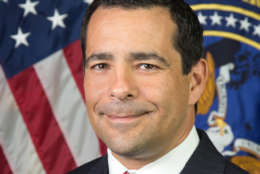Office of the Director of National Intelligence
-
As the Trump administration considers moving the bulk of the governmentwide security clearance process back onto the Pentagon, the head of the National Counterintelligence and Security Center (NCSC) says his agency has a plan to cut the growing security clearance backlog.
May 15, 2018 -
As the conversation around the security clearances is beginning to change, see how the numbers behind the program have changed as well.
April 13, 2018 -
In today's Federal Newscast, after spending 2017 with low budgets, the head of the Coast Guard says his service is now punching at the middleweight class.
April 11, 2018 -
In today's Federal Newscast, the Defense Department says malicious hackers managed to steal the credit card numbers of several hundred people who'd been issued government travel cards.
March 16, 2018 -
In today's Federal Newscast, the Office of Special Counsel updates its its guidance regarding when federal employees' use of social media violates the Hatch Act.
March 08, 2018 -
Stakeholders working in the security clearance community say they're seeking clear, consistent leadership to drive major changes to the governmentwide process.
March 07, 2018 -
As the Defense Department begins preparations in 2018 to process nearly 80 percent of all federal security clearances, the Government Accountability Office paints a messy picture of the governmentwide effort to improve quality and timeliness for background investigations.
December 28, 2017 -
Many civilian agencies say they need more guidance and information from the Office of the Director of National Intelligence about key components of the continuous evaluation program.
November 27, 2017 -
The National Counterintelligence and Security Center plans to deploy its own fully functional continuous evaluation system by fall 2018. Executive branch agencies buy into those services, and NCSC will continually vet agency employees against 10 different databases.
November 17, 2017 -
The House Science, Space and Technology subcommittee on Oversight promises to hold more hearings on the cybersecurity threat of Kaspersky Lab products to the government.
October 25, 2017 -
Jennifer Kron, the acting chief information officer of the Intelligence Community up until Sept. 13, said the ICITE program is having a bigger impact on the IC than most realize.
September 14, 2017 -
Margaret Weichert will be the nominee to be OMB deputy director for management and Jeff Pon will be the new nominee to lead OPM.
September 05, 2017 -
The authors of a new report for the National Infrastructure Advisory Council say their diagnosis of the federal government's cyber problems is nothing new.
August 23, 2017 -
John Sherman is moving from his role as the CIA’s deputy director of its open-source enterprise to be the new intelligence community CIO.
August 21, 2017 -
Even if your people don't handle classified information, you can learn a lot from the National Insider Threat Task Force.
June 21, 2017














